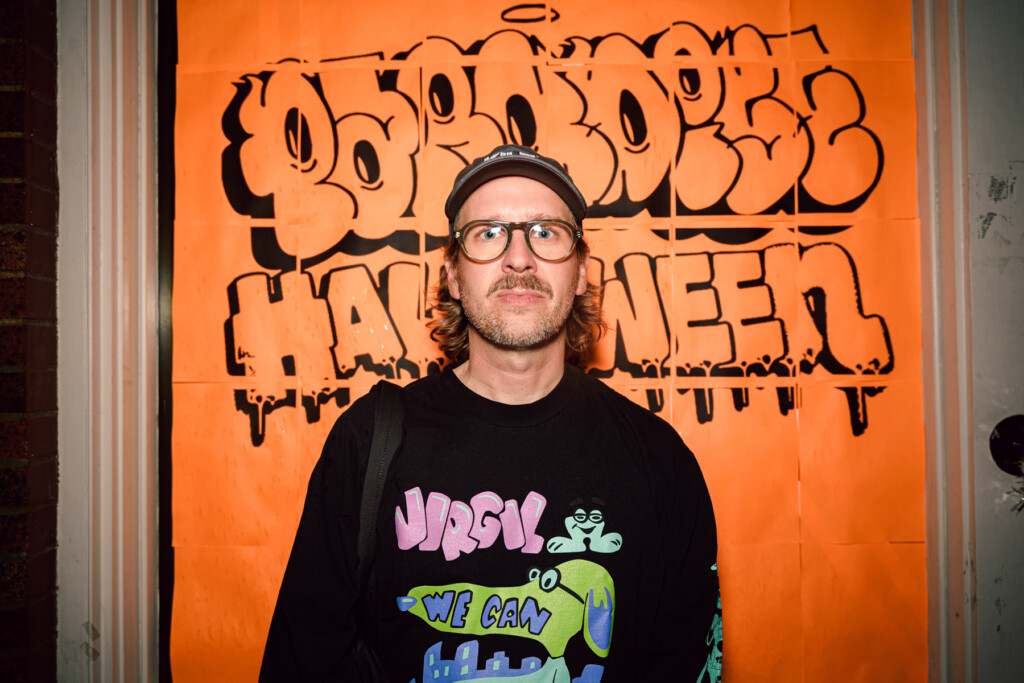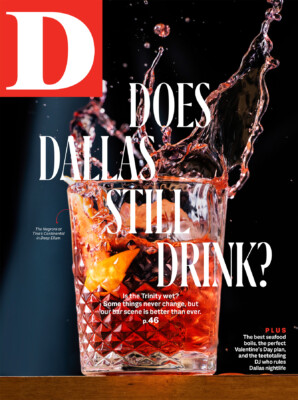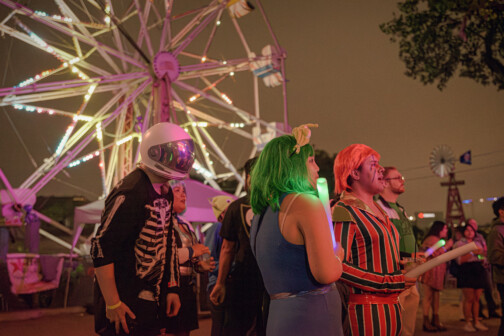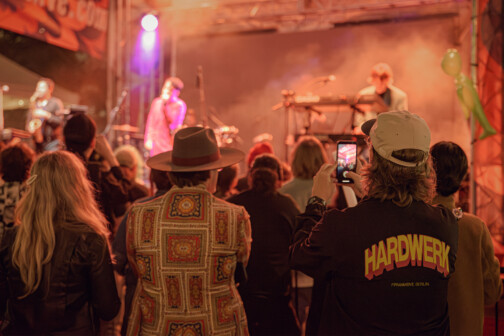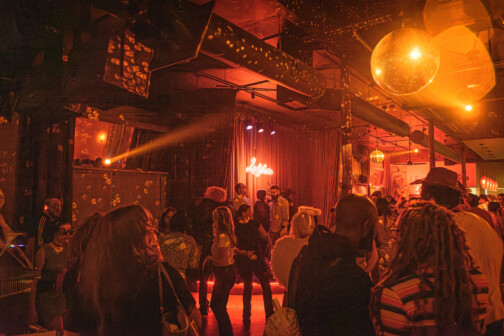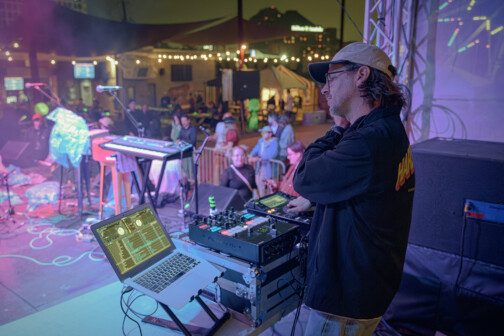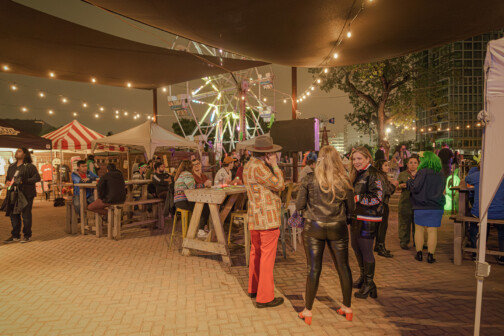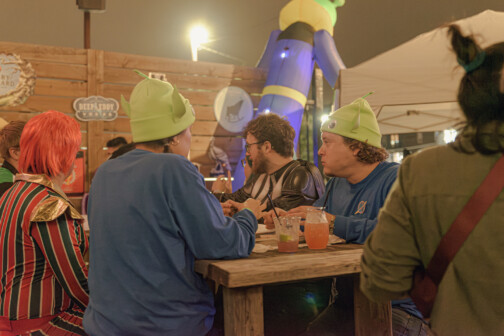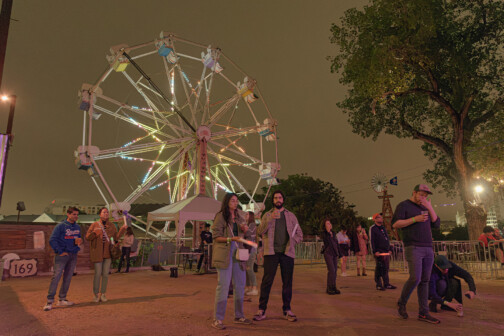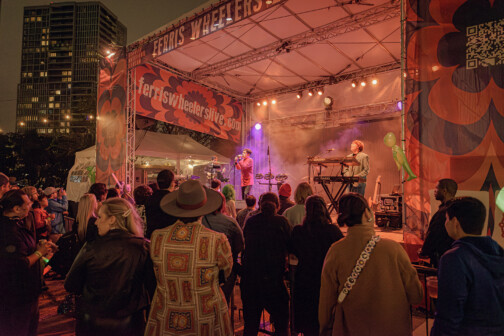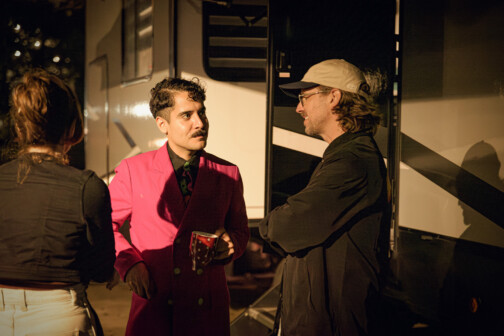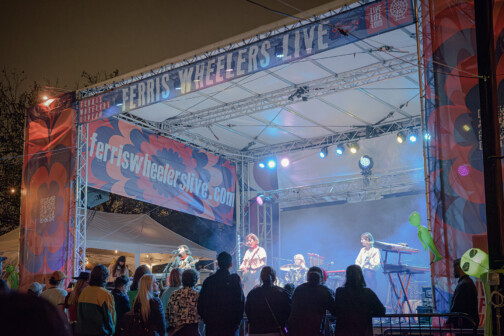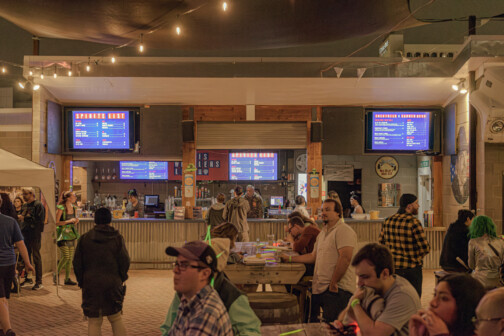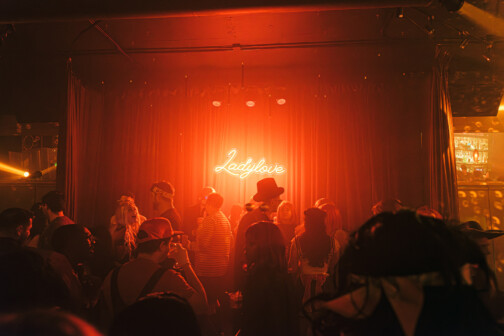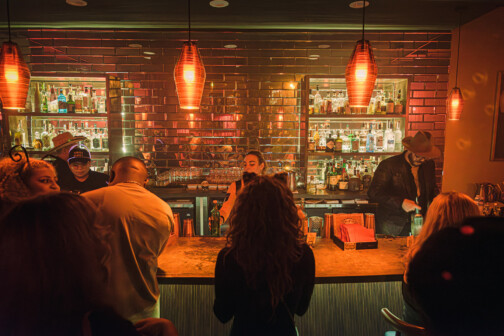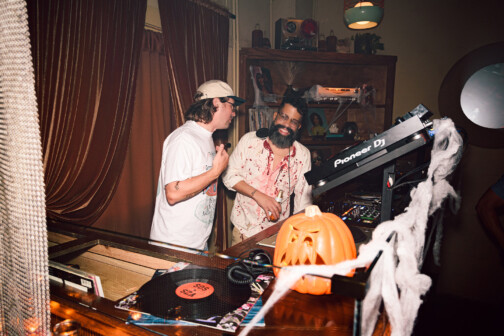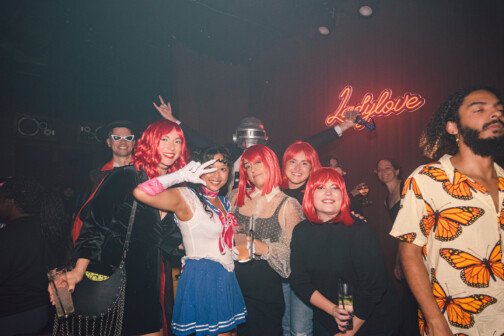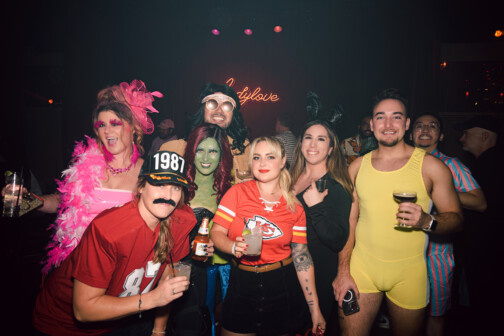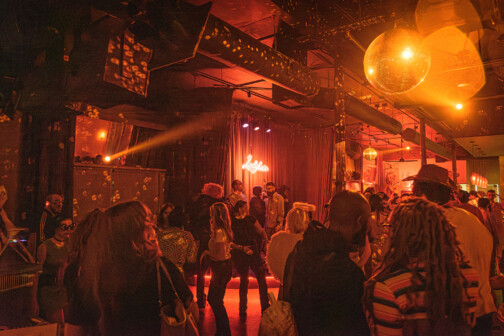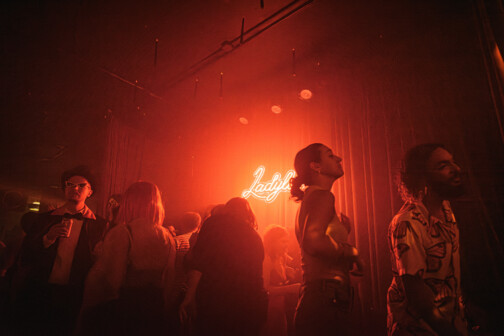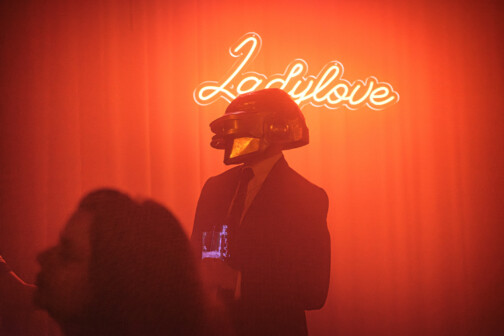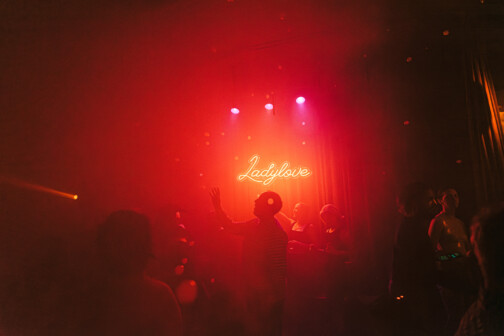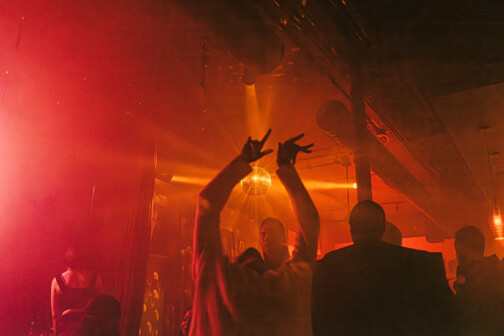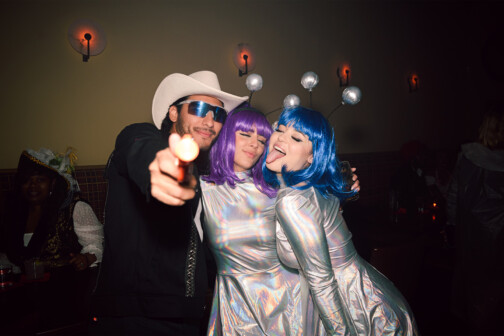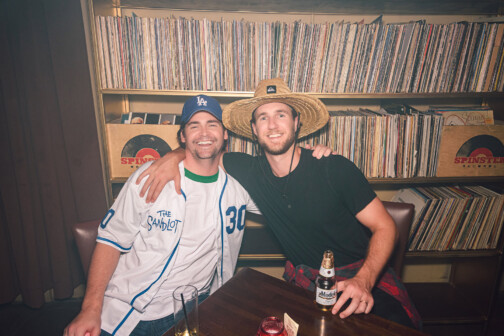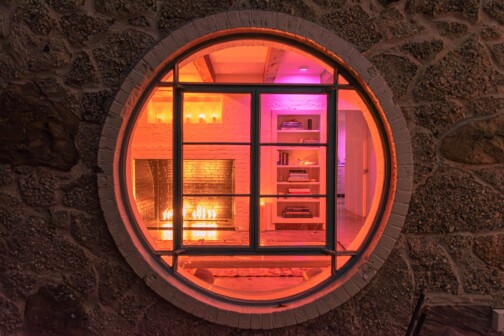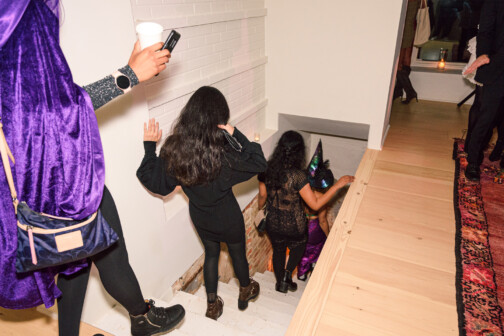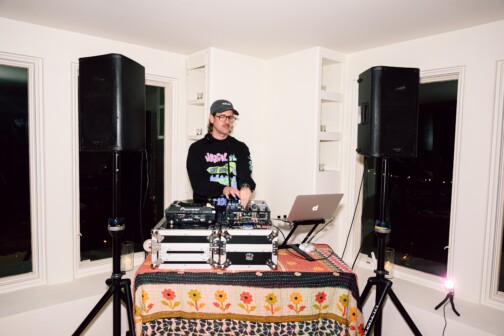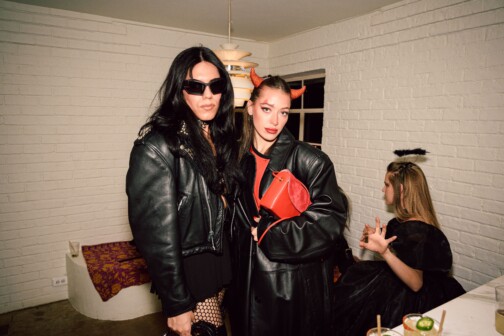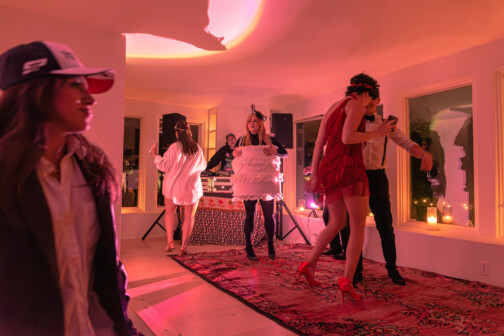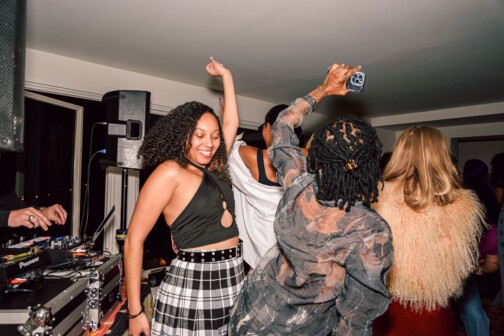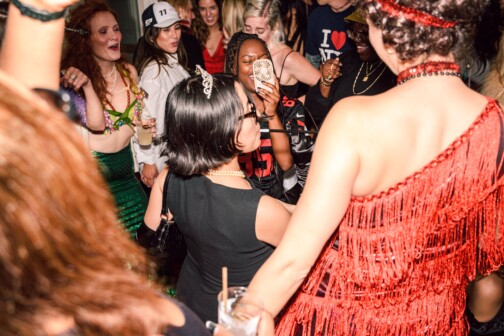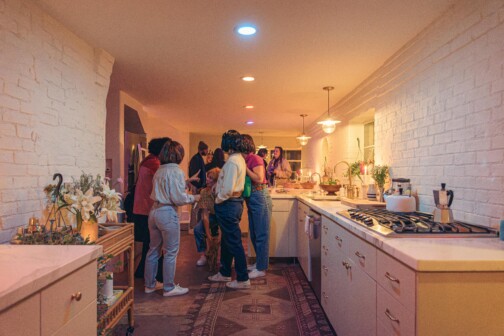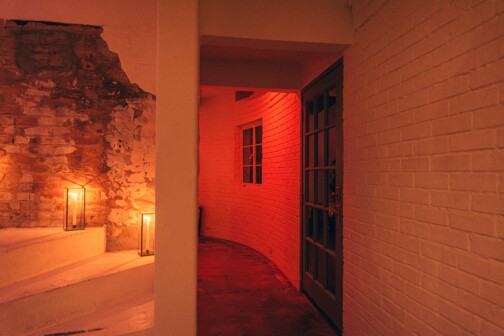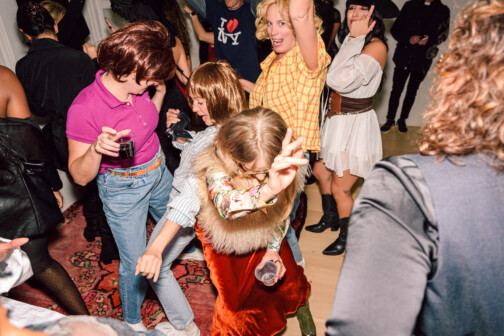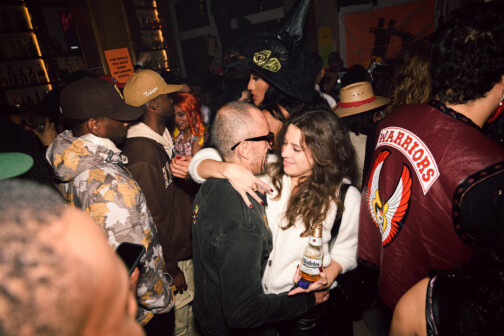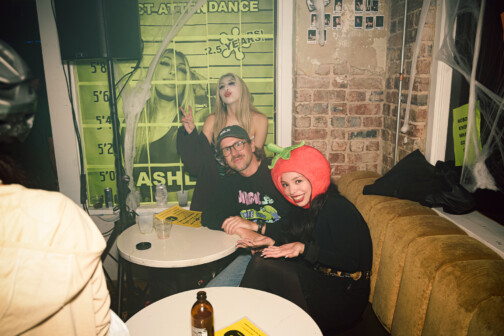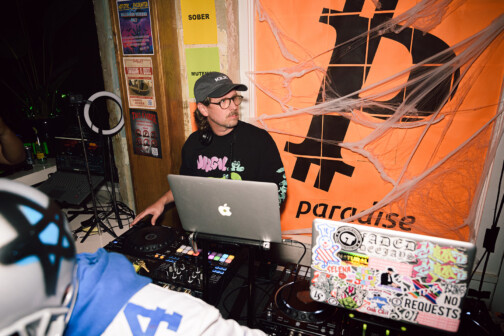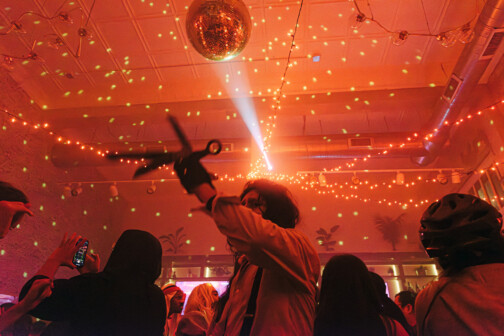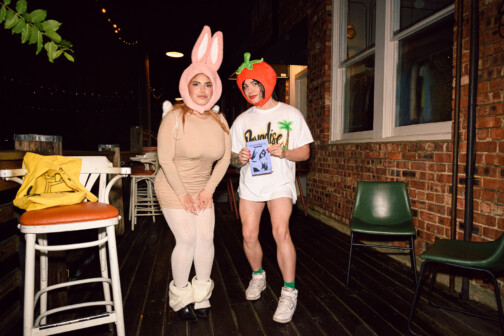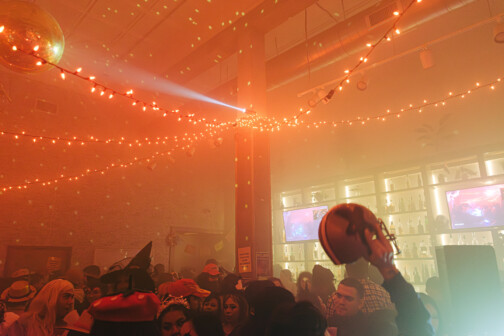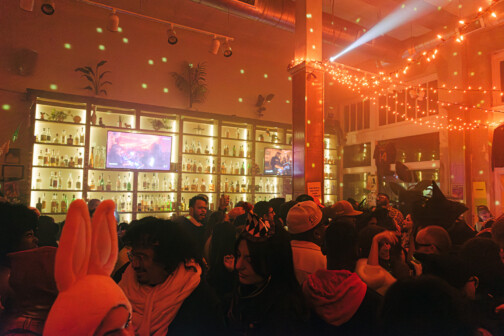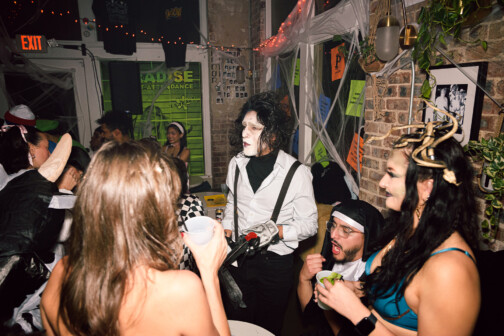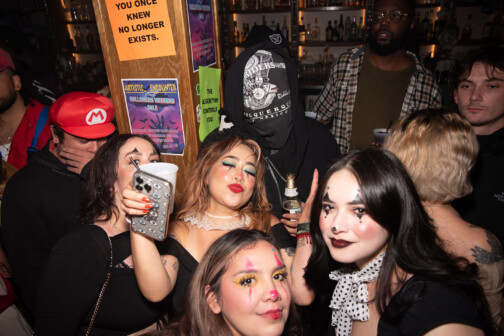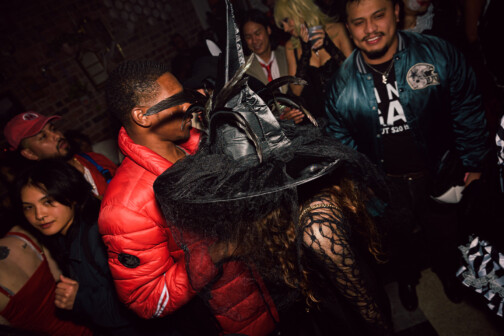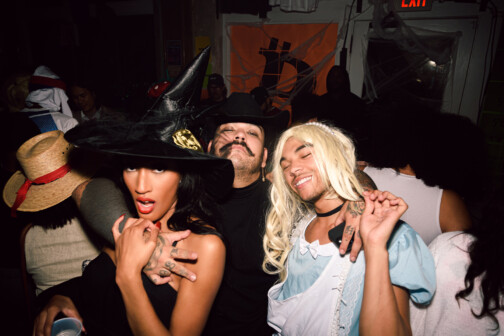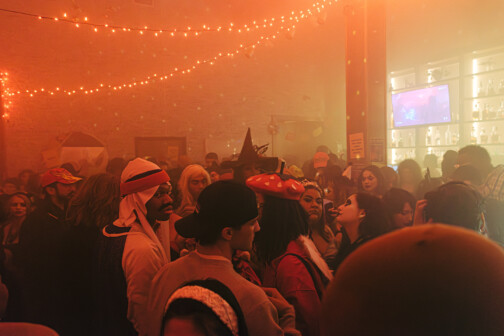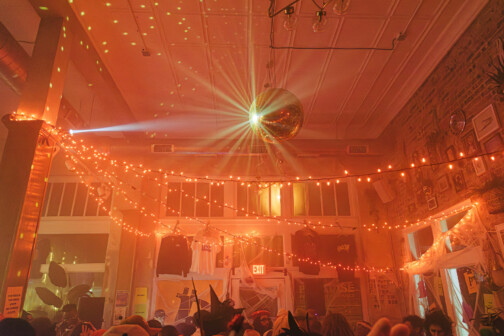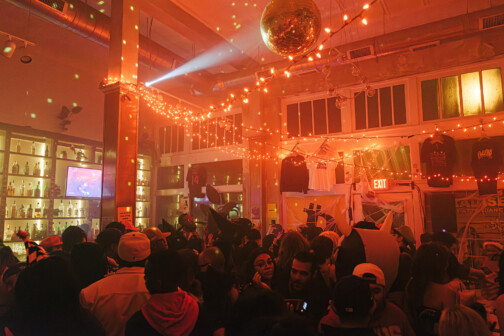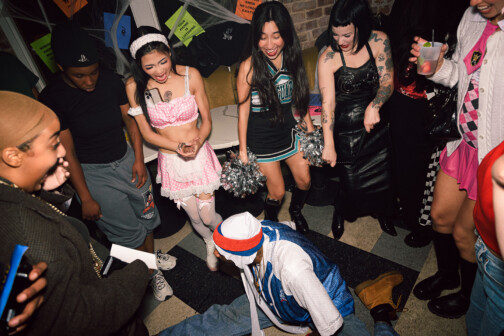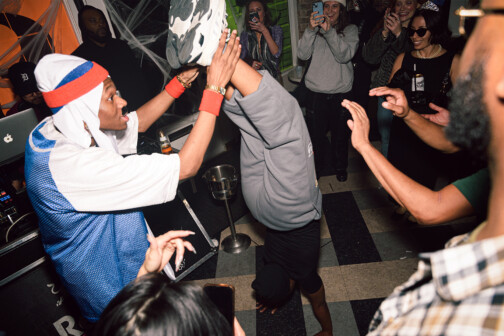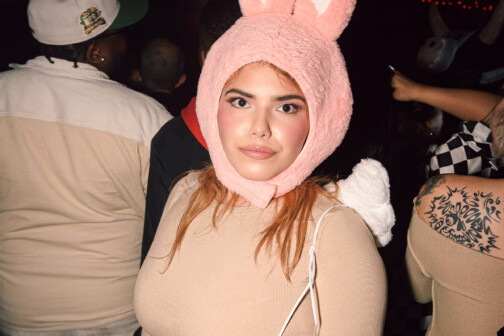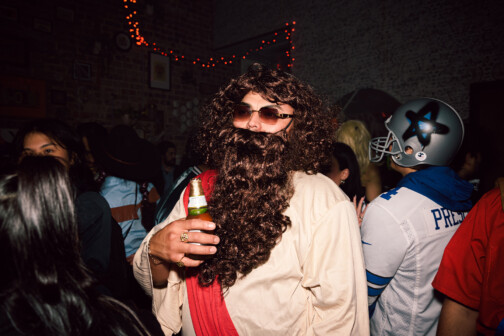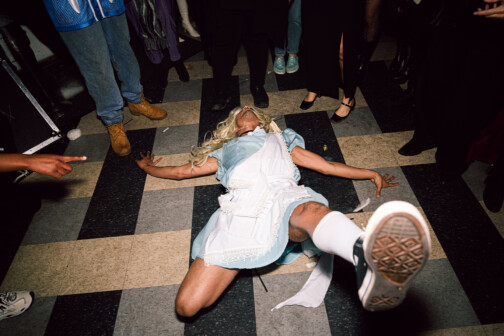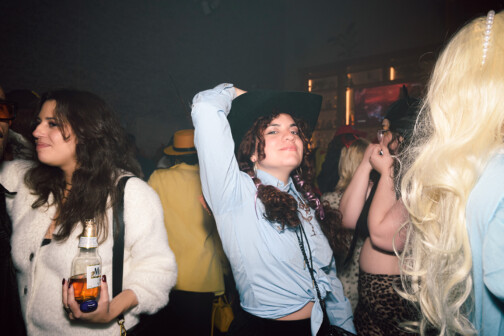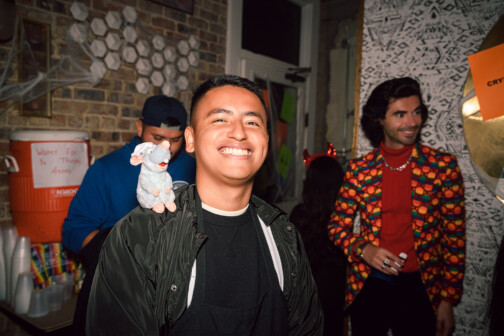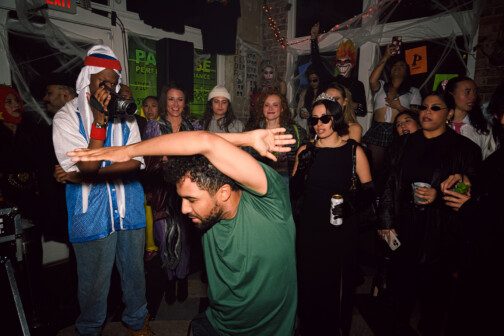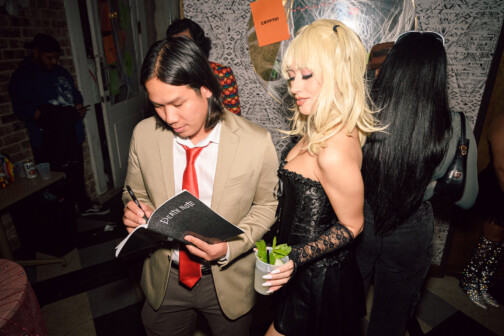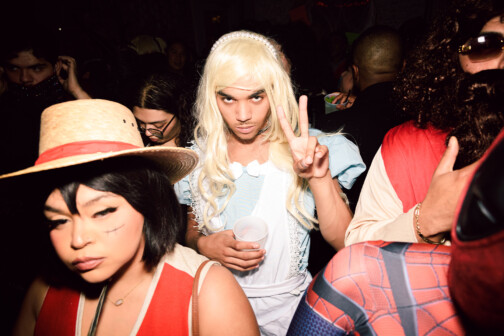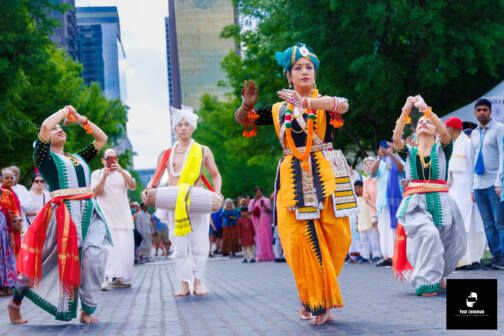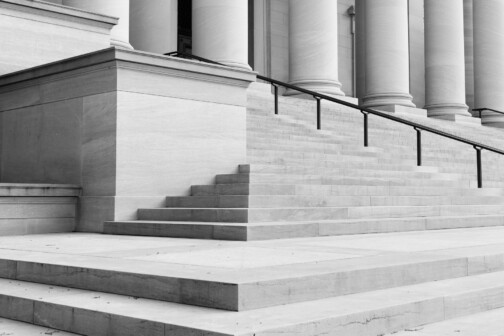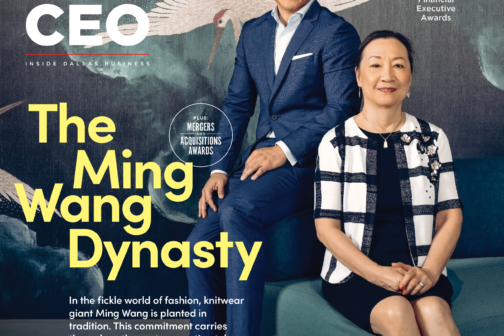It wasn’t quite dead 40 minutes ago, but it was close enough. Call it tame, maybe. Sedate. You don’t want a sedate dance floor unless you’re chaperoning a middle school semiformal. Will Rhoten, aka DJ Sober, wasn’t asked to do much for the first hour, hour and a half, entertaining a handful of polite dancers at a time.
Most of the guests at Château Le Sol’s Sunday-night Halloween party in North Oak Cliff were downstairs then, or outside, or eating smash burgers, or getting a tarot reading, or whatever else. Looking at clothes—I saw some sort of pop-up situation when I walked in. They couldn’t even hear what was going on upstairs.
But the guests eventually made their way up to where Sober is set up in a corner, between two speakers on stands, and now he’s working the mostly female crowd into a frenzy. It is not tame anymore. It is not sedate. It is. Popping. Off. Sober plays Trina’s brash “Long Heels Red Bottoms” and it is … frothing? That seems like the right word. Frothing. They have to crack open a couple of windows even though it is the first cold night of the year. Maybe call it steamy.
You know a DJ is on one when you see people run to the floor from another room and disappear into a mob. Or when you see people emerge from that swarm sweating and out of breath like they just did a HIIT class. Both are happening now. The room glimmers with camera-phone lights.
The energy from the dancers continues to find a higher level, peaking anew with each successive track. He plays Beyoncé’s anthemic “Run the World (Girls)”, and it is now euphoric in here. The floor is writhing. Then Cardi B and Megan Thee Stallion’s “Bongos.” “Bitch, I look like money/You could print my face on a dollar.” The women are embodying this sentiment. They are bodying it.
And, suddenly, everything stops. The music keeps going, but all the women—and, again, it is almost all women—suddenly separate, shifting to either side of the room, two loose rows facing each other. My view is briefly blocked, so I’m confused. Did someone pass out? Are they setting up for some sort of line dance?
Then I see the cause: in their glee, the women have danced the rug covering the hardwood floor into a big lump, a little woven hill in the middle of the room. It is hard to stand, much less move. Once there is enough room, a few of them spread the rug back out, and the party continues for a few more songs. Fifteen minutes later, after Sober wraps up his set, I look out the window to the pool out back. All the women from the dance floor are on the coping, holding hands. They jump in.
I feel like I’ve just witnessed a magic trick, or maybe just actual magic. Sober made all this happen, like a Pied Piper with a mixer.
It’s not the first or last time I’ll see him do that this weekend.
Every gig, Of course, is not like that. Even a great DJ has to grind through a shift or two where they are reminded it is a job. I wasn’t necessarily looking for the downside, but I did want to see what being a DJ entailed. Sober is the best person to give me the full experience. For the better part of two decades, he has been the sound of Dallas, or at least provided the city with its soundtrack.
He’s a load-bearing wall of North Texas nightlife, able to play anything for anyone anywhere, connecting the area’s various subcultures as seamlessly as he connects one song to the next. He’s the center of every Venn diagram you might make. He has spun at Dirk Nowitzki’s wedding and Erykah Badu’s birthday; played Tejano tunes at a Selena tribute at an Oak Cliff burger joint and house music sets at Fort Worth’s popular Meet Me Underground dance party; hosted era-defining residencies at Zubar and Beauty Bar and, for the last two years, at Tiny Victories; opened for rock bands and rappers; entertained at museums and store openings and Mavericks games.
If you’ve gone out in Dallas since George W. Bush’s second term, you’ve encountered Sober, even if you might not have known it at the time.
I’ve known Sober for years and known of him even longer. I booked him to spin at my 40th birthday party, and he’s played at least one D Magazine function that I recall. But I’ve never really watched him work. So I’ve asked to tag along for this busy Halloween weekend—four shows spread over two nights and four locations.
I meet him at his home in Elmwood a little after 5. He was in Mexico City a few hours ago, and has just enough time to drop off his luggage and take one deep breath before he has to grab his gear and head to Ferris Wheelers, the Design District barbecue joint that occasionally moonlights as a concert venue. He’s got a slot opening for Alan Palomo, the erstwhile frontman of early-2010s indie darlings Neon Indian (and an old friend).
It’s been raining off and on for a few days, petering out to a light drizzle today. Since it’s an outdoor stage, he’s fashionably dressed for weather, wearing a black jacket from the German streetwear brand Firmament over jeans and a recently acquired—and not cheap—Lollapalooza 1994 t-shirt in pristine condition. (That year’s edition of the then touring festival, headlined by The Smashing Pumpkins and featuring the Beastie Boys and A Tribe Called Quest, was Sober’s first Lollapalooza.) At the moment, his hair is still pandemic-project long, covering his neck, and tucked under a Rust-Oleum cap; combined with his glasses and mustache, it sort of looks like he’s in disguise. He’s in his mid-40s but comes off younger, which is probably due to a combination of genetics and clean living. Sober is not an ironic name. It’s what he’s always been.
As we cross the Sylvan Avenue bridge on the way to Ferris Wheelers, I ask him if he’s thought about what he’s going to play.
“No, I have nothing planned,” he says.
The squeaky brakes of his station wagon are more of a concern at the moment, but he never thinks too far ahead. He might have a song or two or a few records he wants to work in. That’s about it.
He treats each set, he says, “like choose-your-own adventure.”
“I usually look at the people that are hanging out, start getting a feel of who’s there, and then thinking about tracks or where I want to start. Sometimes that changes multiple times before I start, but that makes it more fun.”
As we pull into the Ferris Wheelers parking lot a little before his 6 pm load-in time, the windbreakered attendant greets him familiarly and directs him to where he can drop off the two black-and-silver flight cases he brought, containing his mixer and pair of CDJs. (The latter allows him to play digital files, so he can bring a USB drive instead of a crate of records.)
“That never happens,” he says, steering into a spot next to a white van in front of the fenced-off backstage area. “Usually I’m like, ‘Oh, I swear I’m DJing,’ and they’re like, ‘I dunno, man.’ ” Ferris Wheelers is run by This & That, the same hospitality company that operates Tiny Victories in Oak Cliff and the nearby Double D’s, both of which regularly book him. But you never know.
He leaves his equipment near the stage steps, and we wander around the mostly empty space, occupied only by staff and a few stragglers who turned a late lunch into happy hour. Palomo is nowhere to be found nor is anyone who appears to be in charge. “I don’t know what’s going on,” Sober says, yawning. “Supposed to be doors in 25 minutes, and I haven’t set a damn thing up.”
The other opener, a trio from London called Girl Ray, is onstage as the soundman roams around with an iPad, testing levels. Sober says he learned from touring that live sound engineers generally don’t care for DJs.
“Some do, but usually the older, more rock ones, it seems like they have a chip on their shoulder that their band never made it.”
A rep from the promoter introduces himself and asks Sober what he needs—pretty much just a table—then leaves to find one. We stop to chat with the women working the door for a bit—topics: kombucha, other concerts tonight—then go backstage again. It’s now three minutes until doors are scheduled to open. “I wasted an hour being here,” he says.
His friend Priscilla arrives and joins us backstage. She’s wearing a Sailor Moon outfit, meant for a costume party later tonight. Priscilla has been helping manage his schedule recently, because he was starting to double-book himself. She asks Sober why he’s not dressed up.
“You don’t dress up when you’re the hardest-working man in show business,” he jokes. “Straight from the flight, go home, grab your shit.”
It’s finally time to start. Sober is set up to the side, almost offstage, on a folding table meant for potato salad, his mixer and CDJs stacked on his cases. Doors open a few minutes behind schedule, and he begins his first set, never having gotten a proper soundcheck, with Kleeer’s “Intimate Connection,” a slow-burning electro-funk slapper released in 1984.
Bobbing and weaving behind his gear, he plays, in some order, an adjacent batch of songs: Patrice Rushen’s “Feels So Real (Won’t Let Go)”; Melba Moore’s “Love’s Comin’ at Ya”; “Love on the Line,” by Ed Longo and the Applied Arts Ensemble; “Take Me to the Top,” by Advance. Crispy early ’80s R&B, heavy on synthesizers and clean-tone guitars. The crowd, still trickling in, is moving, too.
As he’s finishing up around 7:30, the sound guy cuts off his last song abruptly, a hard stop before silence. Sober is irritated because it made him look unprofessional. “I was already fading it,” he says, after rejoining us backstage. Priscilla tells him he’s going back on at 8:15, and they go off to find something to eat.
They come back with waffle fries and bottles of Topo Chico. “I thought there would be more food backstage,” Priscilla says. All that’s around is a sad little tub of Dasani on a picnic table.
“I mean, I think Aquafina could be the only way it could be worse,” says Sober, who would probably know better than anyone. “I think it goes Aquafina is the worst, and then it’s a toss-up between Deja Blue and Dasani. If you’re not going to get Smartwater, then Nestle or Ozarka—those are the ones. Anything with a mountain on it.”
The timing is all off tonight, so he ends up taking the stage again a few minutes after 8. The second set is different—bigger beats, more bass, mostly quicker tempos. Before he was laying down a vibe for the night. Now he’s getting everyone ready to dance.
Or trying to. It’s difficult to build to anything when he keeps getting interrupted. He has to switch to another channel because the soundman wants the one he’s been using. Then they ask him to wrap it up, letting him do a proper fade-out—but switch to a playlist for a few songs before Palomo comes out. Turns out they needed his cables back.
Sober watches a few songs of Palomo’s set and then heads home to change and pick up a few records he wants to play at his next gig, at LadyLove Lounge & Sound in Bishop Arts, where he’ll be sharing the booth with Tony Schwa, another local stalwart known for his Cool Out night. Priscilla stays behind to wait for Sober’s check.
In the car, Sober is frustrated but gets over it quickly. “I felt like I was getting somewhere, and even 10, 15 more minutes, I feel like people would have been dancing or whatever,” he says. “When you’re in between bands, that’s just kind of the way it happens.”
The floor: full. The mood: all caps, in bold and italics and maybe also underlined. The night: possibly infinite?
Anyway, it’ll be different at LadyLove, a place that is purpose-built for DJs, with Technics turntables, CDJs, a mixer, carefully calibrated sound. It gives him a rare chance—in Dallas, anyway—to play vinyl and digital, the kind of equipment situation that is industry-standard in New York or Berlin or other big cities he plays.
Beyond the sound and setup, LadyLove reminds him of the old clubs where he found a home. Sober knows people will talk about nights there—and Double D’s, another place that cares about DJs—the way an older generation might talk about The Party (the Zubar residency he hosted with DJs Select and Nature) or Big Bang! (his long-running Thursday-night shindig at Beauty Bar).
“Dallas is growing, and a lot of new people move here. People come of age or whatever. And there’s so many people that, just since I started playing at LadyLove, have found out about me. Like, Man, I first heard you here. They’re unfamiliar, because they’ve just never dove into that world. And so that’s the cool thing: there’s always new ears to tap in to. I feel like Dallas is in a good place right now, where things are. I feel like cool things are happening.”
Sober’s home is spare and spotless and looks like it was decorated by a stylish protractor. Not unlike its owner. Everything—the furniture, the art on the walls, the stack of coffee table books about the Smiths and Mission School artists Barry McGee and Margaret Kilgallen, a few thousand records in a grid of shelves—is arranged in a series of right angles.
He bought the house in 2007, but his admitted OCD tendencies make it seem like he moved in a month ago. It looks more staged than lived in. (He tracks in a bit of mud onto the Berber carpet of his office/record room when we come back from Ferris Wheelers, and you can tell that is going to bother him for hours.) During the pandemic, for well over a year, this was the only place to see Sober spin, as he livestreamed in front of his vintage Talking Heads and New Order concert posters.
His schedule is a lot more crowded these days. A glance at his desk calendar shows that these are the last four of 15 appearances in October, and it would have been more if he hadn’t spent a week in Mexico. We don’t have much time to chill before the next one. Sober swaps his Firmament jacket for a flannel and packs a few records, mostly a clutch of ’80s discs he had his nephew pick up for him from an estate sale while he was out of town.
“This picture cover of [When in Rome’s] ‘The Promise’ I’ve never seen,” he says. “Dude, it goes for, like, 160 bucks on Discogs.”
Since Sober doesn’t have to bring any equipment, we catch a ride with the nightlife photographer Oscar Lozada to LadyLove. After saying hi to Kate Siamro, one of the club’s co-owners, who is working the door dressed as Joan of Arc, with a real dagger tucked into her belt, Sober slips past the DJ booth’s velvet rope and greets Schwa with a big hug.
The crowd is a little sparse, but it’s early. There are four or five women dancing together in front of the booth, and then seven or eight. Almost everyone is dressed for Halloween. A guy in a Blankman costume (extremely deep cut) dances with an angel in sequined hot pants. Sober takes over for his first set just before 10 and begins to lay a foundation with a pair of breezy roller-skating jams, Zhané’s “Groove Thang” into George Benson’s “Love X Love,” the former of which prompts a woman to approach the booth to ask who it is. A guy in a pretty good Bob Ross get-up leans over the rope to give Sober a pound. Schwa comes back with a Topo and lime for Sober and a Modelo for himself. They clink bottles. They’ve been wanting to team up since playing together at Double D’s not long after it opened, around Thanksgiving in 2022.
You can feel him start to build toward something, maybe the place he was denied at Ferris Wheelers. Crystal Waters’ “Gypsy Woman (La Da Dee)” and Sheila E.’s “A Love Bizarre” and Vanity 6’s “Nasty Girl” and a house mix of Janet Jackson’s “When I Think of You” and a sped-up version of Snoop Dogg’s “Drop It Like It’s Hot,” and everyone here is a frog in boiling water, never noticing the temperature change. And that’s before he gets to Teyana Taylor’s “WTP,” which repeats the phrase those letters stand for—you’ve got Google—at least 20 times before the song really gets going.
By the time Sober cues up Beyoncé’s house-leaning “Break My Soul,” he has the crowd right where he wants it. The floor: full. The mood: all caps, in bold and italics and maybe also underlined. The night: possibly infinite? It’s the last song of this set, so he leaves the booth and vogues briefly among the other dancers.
He comes back about 40 minutes later, and the crowd is screaming along just a few songs in. They scream when he plays Orchestral Manoeuvres in the Dark’s “If You Leave” (an estate-sale score) and drops out everything but the “I touch you once” lyric, then brings the booming backbeat back in. When he follows that with New Order’s “Bizarre Love Triangle” and it gets to the “I get down on my knees” part of the chorus and, regardless of costume, everyone is howling like soccer hooligans. When he eventually gets to Madonna’s “Lucky Star” and then “Like a Prayer” and those hooligans turn into a choir when the song goes a capella.
When he comes back for his last run, I notice Sober is playing more overt crowd-pleasers. Blondie’s “Heart of Glass.” “Rock With You,” by Michael Jackson. Work smart, not hard—especially once you’ve already done the hard work. He concludes with New Order’s “Blue Monday,” triggering High Heart Rate alerts on every Apple Watch within earshot, and Berlin’s “No More Words,” giving the dancers a chance to wind down.
Not long after, around 1:30 in the morning, the bar lights come up, then the sconces on the wall, then everything else. We’re done. Kate Siamro comes over after most of the crowd has been shooed outside. “This was the first night it felt like Beauty Bar in here,” she tells Sober, beaming.
Schwa says his goodbyes. “I always love when we get a chance to play together,” he says to Sober. “You’re the only guy who keeps me guessing.”
We catch a Lyft back to Sober’s house.
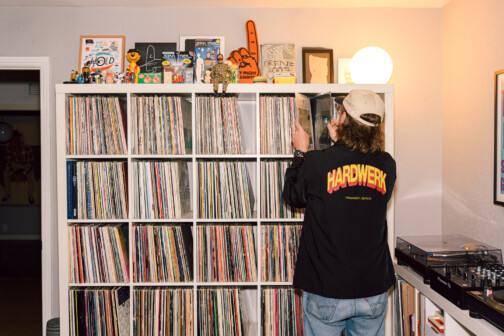
We meet the next night—or I guess later that night—around 7 at the Château Le Sol Halloween party. Château Le Sol is an extension of Le Sol House, a wellness studio/members club hybrid, next door. It’s a two-story event space on a generous piece of land near Kidd Springs Park. A party house, gallery white with glass tile, round windows, and an aesthetic that is art deco, midcentury modern, or ’80s-inspired, depending on who you’re eavesdropping on.
Since nothing is really happening yet, he puts on a mix upstairs and takes the opportunity to wolf down a burger from Gustos, the Fort Worth food truck that just opened a brick-and-mortar. It could be research for him; he’s in the process of opening his own smashburger spot in Elmwood, named Herby’s after his beloved dog.
Le Sol founder Taylor Madison comes over to say hello. She is in a group costume with three of her friends, in the high-waisted denim and sexless short wigs of Tina Fey and her SNL sistren from the “Mom Jeans” commercial parody. She mentions to Sober the idea of doing a monthly residency at Château.
When we visited here earlier in this story, I may have given the impression this party was kind of a letdown. Far from it. There are craft cocktails from Allure & Alchemy and everything else I mentioned, plus a cool crowd, half in costume, half wearing fits I couldn’t pull off even if I were 20 years younger and had the blithe confidence that comes from not having to put a dependent on your insurance plan. The woman dressed like Holly Golightly walking around with a silver serving tray that contains only a tented card that has the c-word on it would probably fall into both categories.
The only issue is Sober is separate from it all, upstairs, a Lambo under a dropcloth. Everyone downstairs is listening to the mix he suggested when one of the hosts asked for “a spooky playlist.” (In fairness, it’s called Stay at Home Goth by the artist SM Sanz and is very good, with Joy Division and Bauhaus and so on.) He’s still not in costume, tonight wearing a long-sleeved t-shirt from the L.A. menswear store Virgil Normal and a different paint-related cap, this one with a Kilz logo. He gets two or three visitors at a time, like a museum exhibition.
Sober could rock a party like this in his sleep. He’s got the muscle memory, the Malcolm Gladwell 10,000 hours. He’s been doing this since he was 16 years old and played a house party in Arlington. (“I remember playing and then hearing the chatter of, like, ‘Man, this kid’s already so good; he’s going to be the next big thing,’ ” he tells me later. “And that made me happy that they were gassing me up because I’d put in a lot of work already in my bedroom at home, at my parents’ house, and I didn’t really want to step out until I felt like I was good enough.”) He’s been in demand—and earning a living—since The Party started at Zubar in 2006.
But he is not going through the motions; everyone downstairs is missing a great set. He plays Marvin Gaye’s “Sexual Healing” into Sade’s “Kiss of Life.” The blue-eyed soul of Bobby Caldwell via “Open Your Eyes.” Spandau Ballet’s “True” blends into the song that samples it, P.M. Dawn’s “Set Adrift on Memory Bliss.” A woman in a very good or at least very accurate “Dirrty”-era Christina Aguilera costume takes photos with her friend in the stairwell, but they don’t hang around.
Around 9:45 or so, there is finally a critical mass, enough to play off of. The hourglass has flipped over, and there are now more people upstairs than down, and they’re starting to rev up. It’s almost time. Sober primes them with a few familiar hits: “I Wanna Dance With Somebody (Who Loves Me),” “Let’s Hear It for the Boy,” “Raspberry Beret.” Daft Punk’s “Around the World” and “Show Me Love,” by Robin S. They’re ready. He plays Teyana Taylor’s “WTP” again. It’s time.
He puts on TT the Artist’s bawdy Baltimore-club-music banger with a title so sex-positive but filthy I can’t really print it here. If I were to give it in the form of a crossword-puzzle clue, I might say “Term of endearment for the cat between 7 and 9?” I might say it’s called “Pushy Hate” if you remove the H’s. Or I could just give you the lyrics of the song, TT the Artist’s opening salvo, and let you fill in the blanks based on context clues: “Don’t want no car/Don’t want no cash/Don’t want no date/I just want my _________.”
The women on the floor go nuts when those last two words hit, and Sober repeats them until the phrase practically loses all meaning, until they become syllables then letters then shapes. It might have been 20 times or 2,000. Taylor from Le Sol is filming with a handheld video camera like she’s Shaquille O’Neal at an early 2000s dunk contest. Sober has his phone out, getting footage for his Instagram Stories.
The next hour feels like five minutes or five days, all gas, no brakes, a gas with no break, building and exploding, building and exploding. The dance floor is so rambunctious that the “Mom Jeans” ladies have to dance in a line in front of the open stairwell, like a riot squad of Karens, so no one accidentally tumbles over.
Eventually, Sober cues up Frank Ocean’s “Thinkin Bout You.” When the song’s opening strings come on, it’s a bit jarring, not so much slowing the car down as throwing it in reverse. Everyone turns toward Sober simultaneously. “Last song,” he says, smiling.
He takes a group photo of the remaining women. Then they leave to jump in the pool. While he’s packing up his gear, Katherine Stephens, who does programming for Le Sol, comes over. “You know your audience very well.”
“That was a blast,” Sober says. He tells her they should do a Valentine’s Day edition of his all-R&B “Satin Sheets” party here. He did one before at Le Sol’s other space. “It was, like, the same shit as tonight, all women and—”
“Very on brand. No, I’d love to do it. We’ll put it in the books. I got the coolest videos. In the room, through the window. Before we have furniture in here, we need to utilize it.”
“At first I was like, everyone wants to hang out downstairs.”
“It always migrates at some point,” she says. “I believed in it, but it just took a second.”
“Man.” He takes a second, too, then grabs his equipment.
It’s time to go to Paradise.
Paradise was the first place Sober played when the world started to open back up in earnest a couple of years ago, a last-Sunday-of-the-month party started by him and Jessi Pereira at Tiny Victories, just off Davis Street in Oak Cliff. He had been mowing lawns for 14 months.
“It was scary,” he says. “It was right when people started doing stuff, and I felt like a lot of people that I respected, and whose decisions I respected, were starting to work again. I hadn’t yet. Some people never stopped. That definitely wasn’t my thing. But I saw some other people were starting, and I was like, ‘Well, I think it’s time.’ So Jessi and I talked it over, and we kind of felt like it was right at that perfect moment, like people were starting to get back out there and do things.”
When we get to Tiny Victories, around 11, Sober’s partner for the evening—Mutemor, aka Mike Cuevas—is already spinning, and it is beyond crowded inside. Pereira is wandering around with her head inside a bonnet shaped like a giant strawberry. The bar is so packed it feels like everyone from the last two nights is in here. It could easily feel claustrophobic, since Tiny Victories is indeed small, but the ceilings are 20 feet tall. I’m posted up against a wall next to a Sexy Freddy Krueger. I see a man in a cowboy hat—costume: unclear—carrying four full drinks through the throng without spilling a drop.
The crowd on the floor is like an amoeba, moving together by force and by choice, not always dancing but also never really not dancing, reminding me of certain Beauty Bar nights when it felt like you couldn’t slip a sheet of notebook paper between the bodies. Sober doesn’t have to manipulate them. He plays more rap and more Latin music than in his previous sets—Drake with various collaborators; Kanye; J Balvin and Tokischa’s “Perra”; “I Look Good,” by Chalie Boy; the Pimp C verse from “Big Pimpin’”—but they are ready to go wherever he wants to take them. He can slow it all the way down and play Mariah Carey’s “We Belong Together,” switch directions, and play a cumbia.
Some songs that he played at other stops over the last two nights show up again, but always in a new way, with different edits and blends, paired with other partners. He is not just the delivery guy for a USB stick, hitting play and sipping Topos. He has to read and react like an option quarterback. The “what” is important, of course, but so is the “how.”
Example: sometime after 1 in the morning, Sober plays the TT the Artist track again, the one that supercharged the Château party a few hours earlier. But the crowd does not pop for it here, and so it makes a much briefer appearance. Instead of repeating her title ad infinitum, the Baltimore rapper just comes in and leaves, from leading actress to walk-on cameo.
Paradise is a worthy successor to his previous residencies, because he can do whatever he wants here. But it probably works so well because he doesn’t do whatever he wants.
It’s the perfect place for this weekend to end. Just before 2, while Mutemor is wrapping up his set, I see Sober is almost through packing up. I slip out the back door.
Fade Out
I meet Sober a couple of weeks later at Josey Records, the massive record store in the shadow of I-635, the natural heir to the late, great Bill’s Records. He’s here to swap out a Cure CD for one in better condition. He’s been stocking up on discs for the jukebox at Herby’s. But mostly we have met to postgame our weekend together, since we didn’t get to talk after Paradise. I have a couple of things I need to clarify, a few questions I didn’t get a chance to ask.
As we flip through the racks, we talk about how the burger spot is progressing and the expensive heart operation that his dog Herby needs. How he got the name Sober (graffiti—he started tagging not long before he started playing parties, and someone told him he should use that “because you don’t do anything”) and the record label he’s launching (first artist: Space Ghost from Oakland).
I ask about his parents, who both died of Alzheimer’s—his father, Bill, in January and his mother, Myra, in February 2016. (He has a tattoo of her on his forearm.) I’m curious, I guess, because my own parents are on the same journey. My dad passed in August, and my mom is not far behind, here but not. I ask if they were supportive of his unusual career path.
“My dad was a super cowboy. My mom grew up in the country. All my parents ever listened to—they didn’t really know. They didn’t tell me I couldn’t do something, or they didn’t discourage me, but I wouldn’t say super supportive. They didn’t understand it.” They didn’t get any of it: the music, the skateboarding, the art. Beyond his illicit tagging, Sober was, and is, a talented illustrator. (You can see some of his work on Instagram at @sobersflyers.) “I just think, because that wasn’t their background, like arts and music and the things I was into, they weren’t really supportive.”
After his mom died, Sober had to help out more with his dad. Bill Rhoten got his Wranglers and shirts starched at a place in Fort Worth called Cowboys Cleaner. Sober went by to pick up his clothes, and the woman working the counter asked if he was Bill’s son. He told her he was.
“You’re the DJ!” she said.
“She was like, ‘Oh, your dad is really, really proud of you. He talks about how, Man, my son’s done this and traveled all over and been here and done that, and he does what he wants to do. And I think a lot of people can’t say that they do something that makes them happy. And I think that’s really cool.’
“And it made me emotional, because my dad was very old-school and is not the kind of—like I said, he was a cowboy, kind of hard. So he never told me those things. And he was past the point of being able to tell me those things at that moment.
“So to hear someone tell me that, to know he was singing my praises or bragging about me, which I never knew, was cool.”
This story originally appeared in the February issue of D Magazine with the headline “Spin Control.” Write to [email protected].
Author



